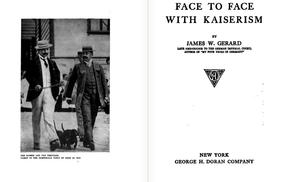
I am reading a book online called "Face to Face with Kaiserism", by James W. Gerard, who was the American Ambassador to Germany in the years leading up to World War I. Here is a brief excerpt talking about the power and financial resources of the then ruler of Germany, Kaiser Wilhelm II. It is fascinating how things have changed in the United States since 1918 . . .
"Before the war the Emperor turned much of his enterprising talent into peaceful channels, into the development of commercial and industrial Germany. No one has a greater respect for wealth and commercial success than the Emperor. He would have made a wonderful success as a man of business. He ought to be the richest person in the Empire, but the militaristic system which he fostered gave that distinction to another. For the richest person in Germany before the war was Frau Krupp-Bohlen, daughter of the late manufacturer of cannon. She inherited control of the factories and the greater part of the fortune of her father and was rated at about $75,000,000. It was a contest between Prince Henckel-Donnersmarck and the Emperor for second place, each being reputed to possess about sixty to sixty-five million dollars. Most of the Emperor's wealth is in landed estates, and of these he has, I believe, about sixty scattered through the Empire. The Emperor is credited with being a large stockholder in both the Krupp works and the Hamburg-American Line. What a sensation it would make in this country were the President to become a large stockholder in Bethlehem Steel or the Winchester Arms Company!
The earnings of the Krupp's factory since the War have been immense and doubtless the fortune of the Krupp heiress since then has more than doubled. The subscriptions to war loans and war charities, thrown by Frau Krupp-Bohlen and the Krupp directors as sops to public opinion, are mere nothings to the fat earnings made by that renowned factory in this war.
And what a sensation, too, would be caused in America if the Bethlehem Steel Company or the United States Steel Corporation were to purchase newspapers or take over The Associated Press in order to control public opinion! Yet the German nation stands by, apathetic, propagandised to a standstill, stuffed and fed by news handed them by the Krupps and the alliance of six great industrial iron and steel companies of western Germany."
 RSS Feed
RSS Feed